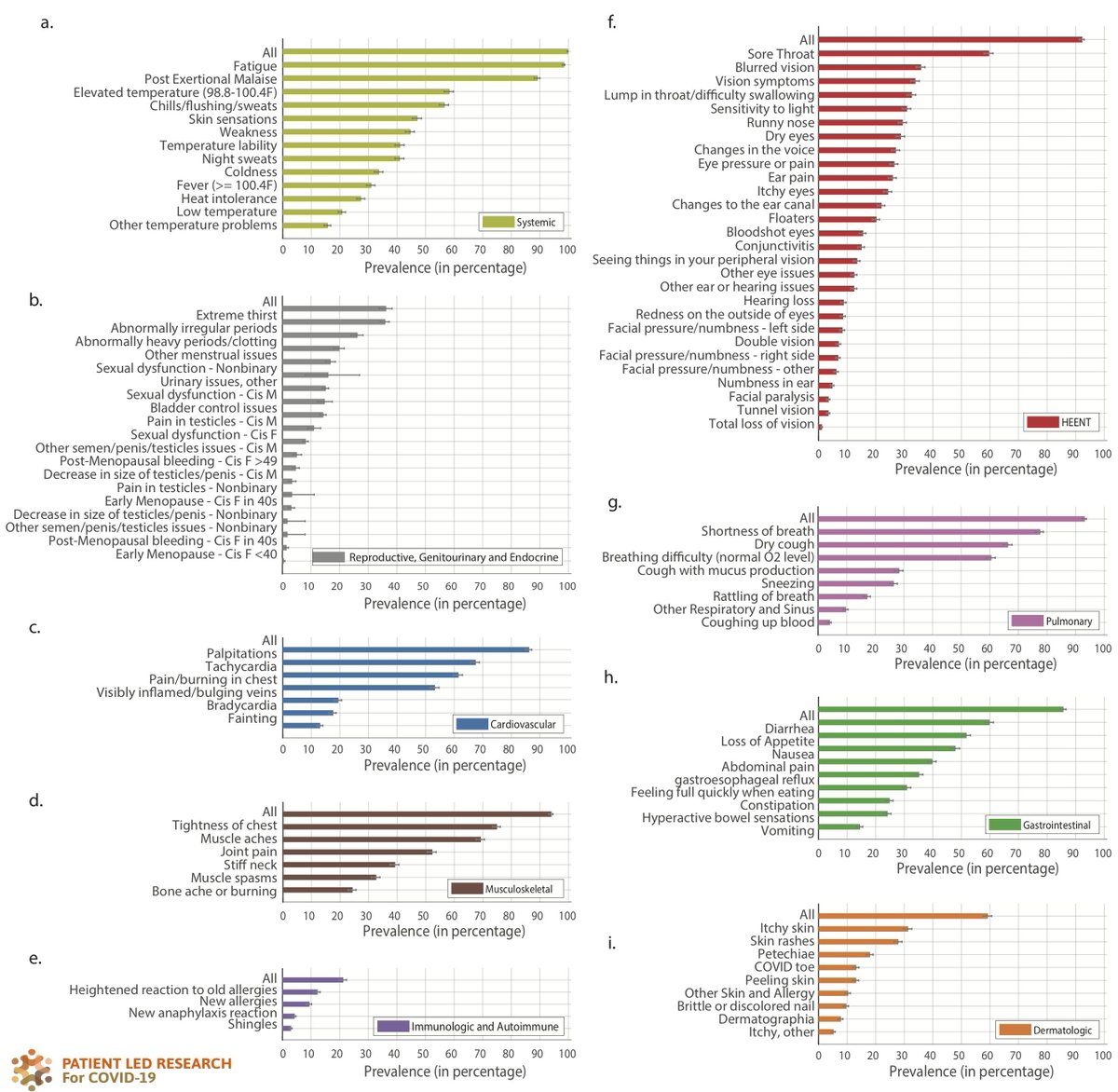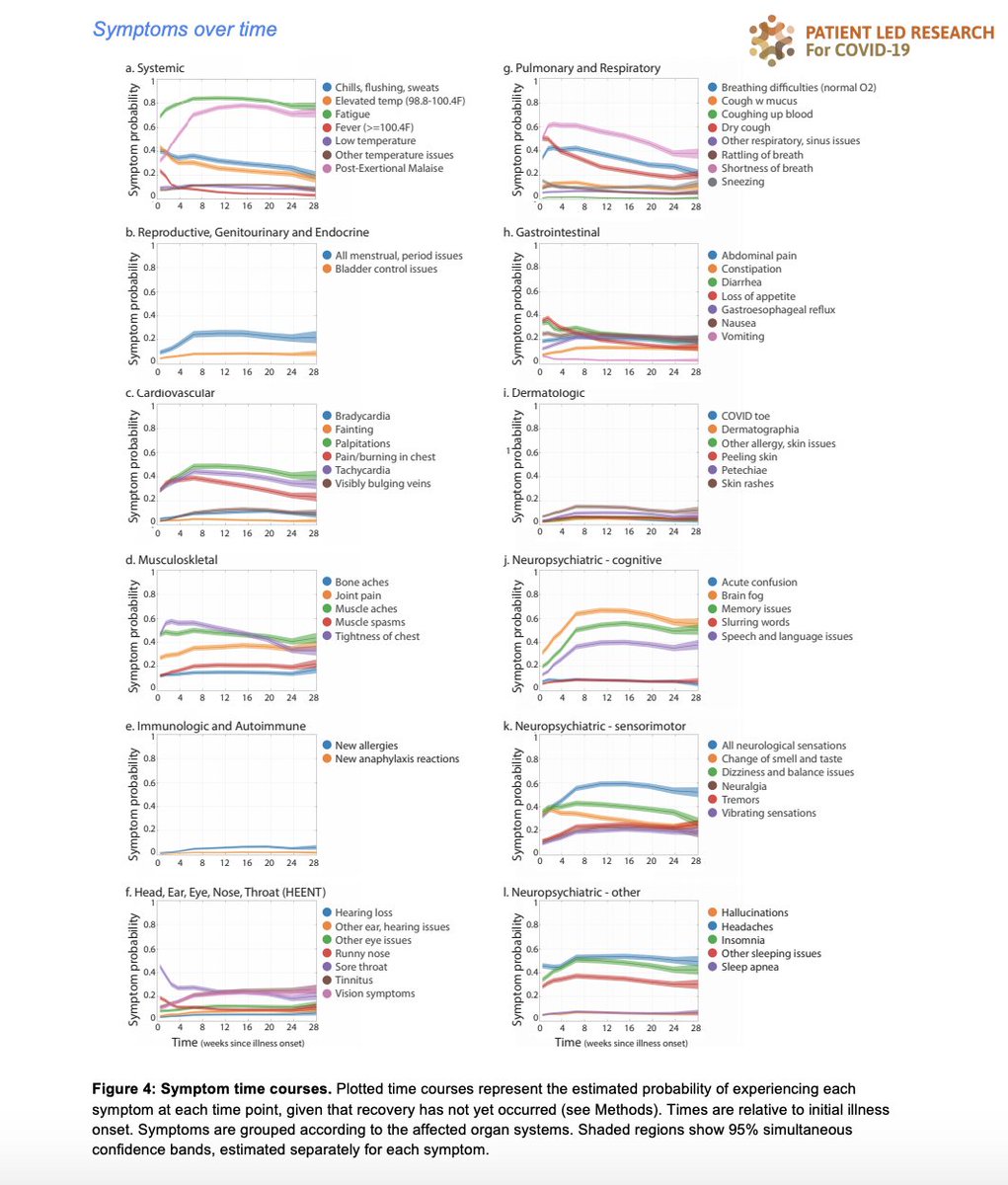
I just crossed the 4 month mark of being sick w' #COVID19. I am young, & I was healthy. Dying is not the only thing to worry about. I still have a near-daily fever, loss of cognitive function, essential tremors, GI issues, severe headaches, heartrate of 150+, viral arthritis, 1/
heart palpitations, muscle aches, a feeling like my body has forgotten to breathe. Over the past 124 days I've lost all feeling in my arms & hands, had extreme back/kidney/rib pain, phantom smells (like someone BBQing bad meat), tinnitus, difficulty understanding text/reading, 2/
difficulty following conversations, sensitivity to noise & light, nonstop bruising. *Thinking* can cause headaches now. I'm not alone in the cognitive issues; it's as common a symptom as cough.
No one knows when #longcovid patients aren't contagious; many are alone for months.
No one knows when #longcovid patients aren't contagious; many are alone for months.
People w' #longcovid weren't able to get testing until late. There are people on my same timeline who are only now learning they had strokes & encephalitis & heart attacks. MRIs/CT scans were only accessible in the ER. Drs were solely looking at the lungs for way too long. 4/
The symptoms are bizarre. There are people with brand new #allergies to the point of anaphylaxis; others whose allergies have disappeared. Post-menopausal women who are having spotting and periods again. Medications spontaneously stop working, need to be adjusted higher/lower. 5/
It causes flareups of other viruses, past surgeries, other conditions. Old injuries are raw & feel new again. My left leg & foot, injured in a moped accident in 2017, feels crushed like it happened yesterday.
Intolerance to exercise, alcohol, caffeine, & stress are common. 6/
Intolerance to exercise, alcohol, caffeine, & stress are common. 6/
Insomnia is common. The dreams are vivid & bizarre, often lucid dreams, often violent & nightmarish, many reports of dreaming about people who have passed away.
The symptoms wax & wane; you think you're getting better, only to be hit again. New symptoms appear constantly. 7/
The symptoms wax & wane; you think you're getting better, only to be hit again. New symptoms appear constantly. 7/
The CDC is starting to acknowledge us & the #LongCovid numbers are high: 35% of people are not back to normal after the suggested 'recovery' period.
Given the US's current cases of 4.2 million, that's 1,470,000 long haulers in the US alone.
cdc.gov/mmwr/volumes/6… 8/
Given the US's current cases of 4.2 million, that's 1,470,000 long haulers in the US alone.
cdc.gov/mmwr/volumes/6… 8/
In patients aged 18-34 with no pre-existing conditions, that number is 20%. I was in that unlucky camp & you could be too. This life is a weird parallel one where almost everything in your old world feels alien & unreal; I don't want it to happen to a single other person. 9/
I had been isolating for 11 days on the day of my first symptoms and I probably got it on a trip to the grocery store. There is almost nothing that is worth losing 4+ months of your life in this way. No BBQ, no tech event, no haircut. 10/
This isn't the flu where you can curl up with netflix and tea for a few weeks; this is an active, awful illness with neurological effects for most.
For now we're holding out hope for #recognition, #research & #rehab. And we're doing our own research: patientresearchcovid19.com 11/
For now we're holding out hope for #recognition, #research & #rehab. And we're doing our own research: patientresearchcovid19.com 11/
I want to add that people with myalgic encephalomyelitis (#pwme) have gone through this same thing without any of the attention #LongCovid is getting; we need to remember them & bring them along with whatever recognition & funding we receive. And IMPORTANTLY, like #ME... 12/
...we are going to be in trouble if we start getting lumped into a singular diagnosis or the dismissive "chronic fatigue syndrome"; everyone's #LongCovid struggles are different, not everyone has fatigue/exercise intolerance, advocacy for heterogeneous treatments is vital! 13/
Damn, this took off. If you want to help support our patient-led research into #LongCovid, please donate! patientresearchcovid19.com/donate/ 14/
And if you're also dealing with #longcovid, join a support group! I recommend:
Body Politic support group (on Slack) wearebodypolitic.com/covid19
Long Haul Covid Fighters (for people at 80+days) facebook.com/groups/2706248…
Long COVID support group
facebook.com/groups/longcov… 15/
Body Politic support group (on Slack) wearebodypolitic.com/covid19
Long Haul Covid Fighters (for people at 80+days) facebook.com/groups/2706248…
Long COVID support group
facebook.com/groups/longcov… 15/
#LongCovid owes so much to @edyong209, who wrote this amazing piece on long haulers back in June. After this piece doctors started believing us. theatlantic.com/health/archive… 16/
For 100+ other articles and patient stories on #LongCovid, see c19recoveryawareness.com/articles-page-2 17/
I kind of hate to add this tweet since I've scared so many people already, but I've had a pretty mild case of #longcovid. I know people w' facial paralysis, hearing loss, vision loss, encephalitis, seizures, continued loss of taste - all on the same ~4 month timeline as me. 18/
Also, kids are getting #LongCovid too. If I were a parent, there is no world in which I'd be sending my kid back to school. 19/
https://twitter.com/ahandvanish/status/1284960268829818882
Here’s my piece in the Guardian summarizing all of the above as well as four policy changes that will help people with #LongCovid or #COVID19 generally
https://twitter.com/ahandvanish/status/1291044903498194950?s=2120/
Let’s add “false positive pregnancy test” to the bizarre list
https://twitter.com/katemeredithp/status/1292463413311004672?s=21https://t.co/t1YVOtmumR
• • •
Missing some Tweet in this thread? You can try to
force a refresh





